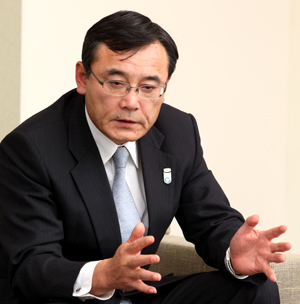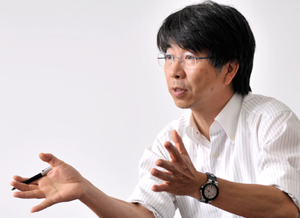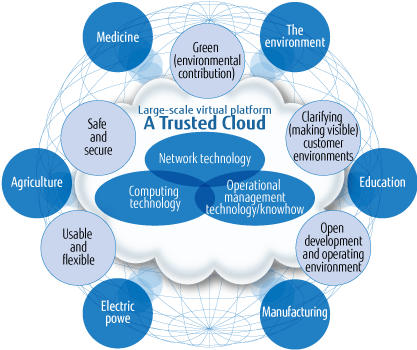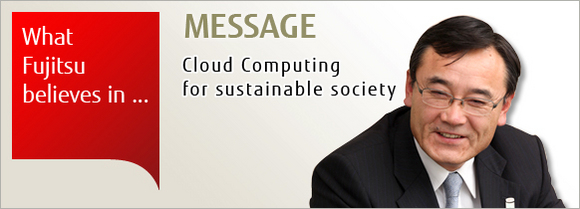Archived content
NOTE: this is an archived page and the content is likely to be out of date.
What Fujitsu Believes in...
President and Representative Director
Masami Yamamoto
With the widespread use of smartphones, social media, and blogs, information and communication technologies (ICT) now touch upon every aspect of our daily lives. Today I would like to discuss cloud computing. Cloud computing is a new way of using computers in which the user accesses ICT resources on the other side of an internet connection, using just the amount of resources needed just when they are needed, and pays just for the amount used.

Because it takes a concentrated approach to data processing using virtualization technology, cloud computing is exceedingly efficient in its use of energy, contributing to the creation of a sustainable society. Furthermore, because no large upfront investments are needed to use cloud-based services, it can be said that cloud computing holds the key to the spread of ICT in developing countries.
Because cloud-based platforms are able to collect huge volumes of diverse data, they can be used to generate new insights to help resolve many of the challenges facing mankind. For example, the meticulous cultivation techniques of veteran Japanese farmers could be applied to massive farming operations in Brazil to improve efficiency, or expertise in preventative medicine could be used to help in preventing the spread infectious diseases in developing countries. With its Global Cloud Platform delivering public cloud services in Japan, Australia, Singapore, the UK, Germany, and the US, Fujitsu has world-class cloud technologies and capabilities.
An engine for enabling everyone to access a “global-scale brain” and reduce the consumption of natural resources
Chiseki Sagawa, Senior Vice President of the Software Integration Business Group

While ICT currently accounts for some 2% of total global CO2 emissions, efficiency improvements are expected to reduce total CO2 emissions by 15% in 2020, indicating the great potential ICT has in contributing to sustainable development. Forty years have passed since the Club of Rome’s 1972 report, “The Limits to Growth,” first sounded the alarm bells regarding resource scarcity and environmental issues. Today the ICT industry must offer innovative services in which its own growth is no longer tied to the consumption of natural resources. I clearly remember the sense of urgency I felt regarding the earth’s limits upon reading the Club of Rome’s report, prompting me to begin research at a US university on how to secure sources of protein from the ocean for the purpose of generating sufficient global food supplies.
Large population increases, primarily among developing nations, are anticipated to take the world's population from today's 7 billion to 9.2 billion by 2050. The rate at which global resources are being consumed is increasing even faster than the world’s population, and it is claimed that if all people were to enjoy the same standard of living as those in the developed nations, it would require 2.8 planet Earths. On the other hand, the number of internet users has effectively doubled between 2007 and 2012, and now exceeds 2.3 billion. Today a world-wide networked society, unfettered from physical constraints, is becoming a common platform for human activity.
As the world becomes flatter, the amount of energy consumption per person also increases, leading to a massive shortage of the natural resources that support global development. To help resolve these issues, Fujitsu is committed to leveraging ICT to enable sustainable growth while minimizing the consumption of resources. Under these circumstances, for the international community to pursue sustainable development, Fujitsu believes that that effective use of an ICT-enabled digital virtual society is essential.
That is why Fujitsu is strengthening the systems installed in datacenters and the network access to the cloud services they provide. By organically linking and putting to use the huge volume of diverse data collected from around the world in cloud-based platforms, it may be possible to generate new insights for resolving the problems facing society. For example, ICT can be utilized to follow the movement of people and things, and cloud services appropriate to given locations could be delivered. This would help to eliminate wasteful electricity consumption and wasted effort resulting from lack of familiarity, thereby optimizing our activities by empowering us and making our activities sustainable.

In providing cloud services used by many people, reliability is the highest priority. Datacenters must also achieve further reductions in their energy requirements. With this in mind, Fujitsu is offering its customers both convenience and a sense of security through a Trusted Cloud Service. This service, which is built on a platform of Fujitsu’s systems products, such as servers, storage, and software, for mission-critical enterprise applications, is based on Fujitsu’s vertically-integrated model, which brings together computing technologies, such as the latest methods for processing big data, with platform technologies for using datacenters. The cloud platform delivering this service offers the world’s top level of reliability (99.99% uptime) and leverages such advanced technologies as Fujitsu’s Global Cloud Platform public cloud service, which, from among Fujitsu’s 100 datacenters around the world, is hosted at datacenters in Japan, Australia, Singapore, the UK, Germany, and the US. Through these efforts, while seeking to achieve greater energy efficiency, including a ten-fold increase in efficiency starting in fiscal 2012 , Fujitsu also seeks to offer a safe and secure platform to support growth.
Companies now must ensure that their latest network-based services quickly reflect social and global changes, and Fujitsu seeks to offer cloud services that will support the organic integration of information and services generated all over the world. The cloud services Fujitsu aims to create will provide everyone with free and equal access to "global-scale brain" business engine. At Fujitsu, we are working with our customers in various fields to help build a sustainable society on this "trusted cloud" base.

MESSAGE (2.66 MB )
Fujitsu developed the MESSAGE to share our thoughts to contribute to the sustainability of society.

